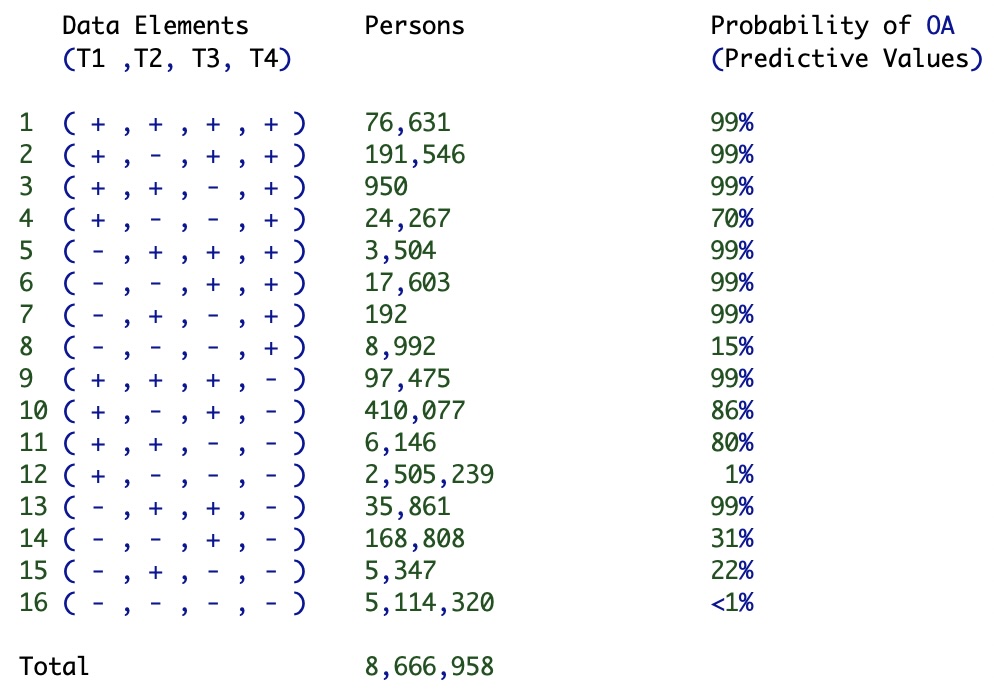Session Information
Session Type: Poster Session C
Session Time: 10:30AM-12:30PM
Background/Purpose: Osteoarthritis (OA) is the most prevalent arthritis and a significant contributor to Years Lived with Disability. Administrative health data are widely used to study OA prevalence, treatments, comorbidities, and healthcare costs. However, the use of these data is limited by inadequate case ascertainment. Existing algorithms have low sensitivity (~49%) or specificity (~60-95%), resulting in biased samples. Chart review-based validation is imperfect, not fully generalizable across datasets, and infeasible for large populations. We aimed to develop a Bayesian algorithm to improve OA case ascertainment in administrative health data without requiring chart review.
Methods: We developed a latent class Bayesian multinomial model to estimate the probability of OA in an individual using a “No Reference Standard” approach. This methodology allows estimating sensitivity, specificity, and predictive values using observed true positive and false positive fractions and unobserved (latent) true prevalence. We included all individuals aged 18-65 with continuous enrollment in Merative MarketScan Research Databases 2018-2019. We excluded those with a history of psoriasis, rheumatoid arthritis, fibromyalgia, or knee replacement. The algorithm included all possible combinations of four data elements: knee OA diagnosis, knee pain indication/NSAID/opioid prescription, knee imaging, and meniscal/ACL tear.
Results: Our Bayesian algorithm estimated OA probabilities for 8,666,958 eligible individuals based on all data element combinations. The probability of a person having OA was estimated to be ~99% in 8 (out of 16) combinations of the data element outcomes (Table 1). The probability of OA for a person coded for OA, but not coded for other data elements was less than 1%. Having an OA code and at least one more positive data element yielded >70% probability of OA.
Conclusion: Our Bayesian algorithm improves OA identification in administrative data without requiring chart review via selecting the most informative data element combinations that provide highest predictive values. This approach is applicable to other conditions where reference standards are unavailable.
T1: Knee OA diagnosis claim (ICD_10) between 01/01/2018 and 12/31/2019,
T2: Claim for knee pain, or NSAIDs/opioid prescription between 01/01/2018 and 12/31/2019,
T3: Knee imaging (X-ray/MRI) claim between 10/1/2015 and 12/31/2019,
T4: Meniscal/ACL tear claim between 10/1/2015 and 12/31/2019.
To cite this abstract in AMA style:
Jafarzadeh S, Tilley S, Arvind A, Felson D. Bayesian Algorithm to Identify Osteoarthritis in Administrative Health Data Without Requiring Chart Review [abstract]. Arthritis Rheumatol. 2024; 76 (suppl 9). https://acrabstracts.org/abstract/bayesian-algorithm-to-identify-osteoarthritis-in-administrative-health-data-without-requiring-chart-review/. Accessed .« Back to ACR Convergence 2024
ACR Meeting Abstracts - https://acrabstracts.org/abstract/bayesian-algorithm-to-identify-osteoarthritis-in-administrative-health-data-without-requiring-chart-review/

